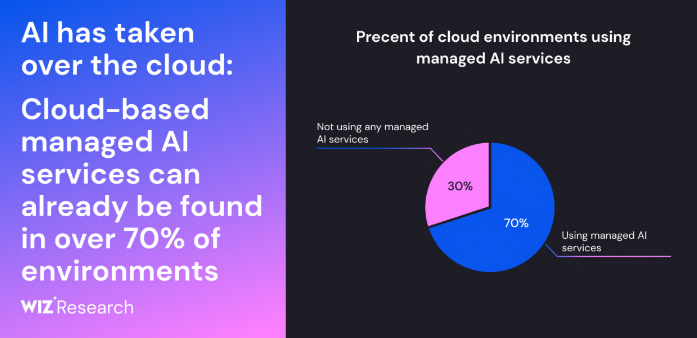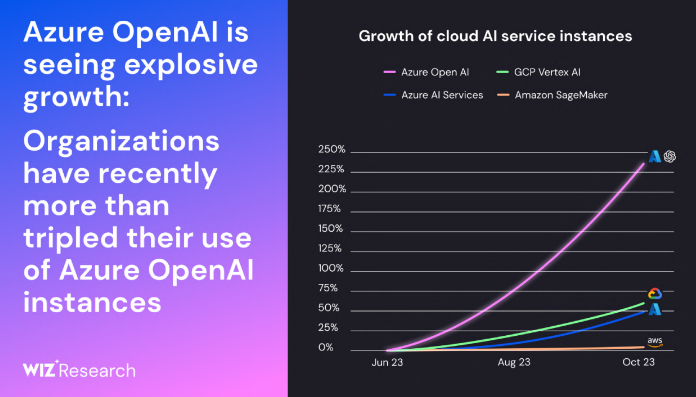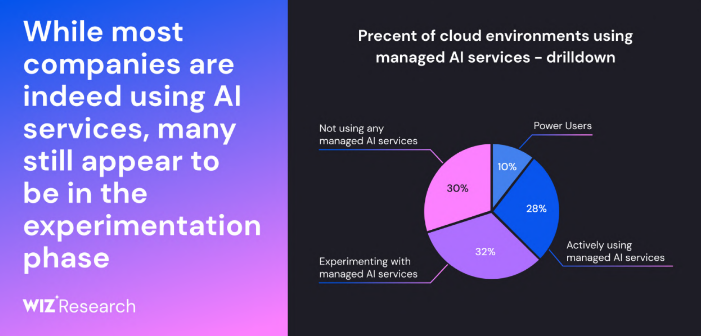 AI
AI
 AI
AI
 AI
AI
Cybersecurity firm Wiz Inc.’s latest research highlights the explosive adoption rate of managed artificial intelligence services and self-hosted AI tools in the cloud.
The impressive growth of AI is being driven by the rise of generative AI models such as ChatGPT, which has made the technology almost as popular as the open-source Kubernetes software that sits at the heart of most modern business applications. Published today, Wiz’s State of AI in the Cloud 2024 report is based on a comprehensive sample size of more than 150,000 public cloud accounts. It provides some of the strongest evidence yet of the enterprise’s insatiable appetite for AI tools that can potentially enhance their business processes and reduce operating costs.
Wiz’s researchers say that generative AI has, in the last 18 months, come from nowhere to become the hottest segment in the technology industry today. Although traditional AI and machine learning services have been around for several years and widely integrated with various products, the rise of generative AI powered by large language models has pushed the technology into the public consciousness.
Generative AI’s rise kicked off in July 2022 with the beta releases of image generation models such as OpenAI’s DALL-E 2 and Midjourney, and was accelerated by the launch of ChatGPT toward the end of that year.
ChatGPT caught the public’s imagination like no other AI model preceding it, and ever since its release there has been a mad scramble among businesses to see how they can implement the technology in their products and services. According to Wiz, this has propelled the growth of an emerging community of AI builders and the development services and tools for training, fine-tuning, managing and deploying AI models.
Wiz points out that generative AI is truly a cloud-native technology because of the extremely compute-intensive nature of training and inference. As a result, it has become necessary for organizations to take advantage of the unrivaled scalability of cloud computing infrastructure.
The report found that more than 70% of cloud computing environments up and running today employ managed AI services such as Azure OpenAI Service, Amazon SageMaker and Google Cloud’s Vertex AI.

That signifies an incredible rate of adoption. In contrast, the popular Kubernetes container orchestration software, which is the foundation of most business applications today, has been deployed in 81% of all cloud environments, Wiz’s research found.
So even though AI services are a very recent development, they have already become almost as common as one of the most dominant and widely used open-source software projects ever conceived. “To us, this indicates that cloud-based AI services are seeing an unusually high rate of adoption relative to other services,” Wiz’s researchers said.
Given Microsoft Corp.’s close association with OpenAI, it’s perhaps no surprise that Azure AI Services has emerged as the most popular fully managed AI service in the cloud. According to Wiz, Azure OpenAI witnessed a 228% increase in new users over a period of just four months in 2023.
That said, Microsoft’s rivals aren’t far behind. Although 54% of all Azure environments include managed Azure OpenAI instances, 53% of AWS environments include Amazon’s equivalent SageMaker service, while 44% of Google Cloud environments include Vertex AI or AI Platform instances.

Though Wiz concludes that the growth in AI services is almost unparalleled, it points out that 32% of enterprises are still experimenting with the technology, with fewer than 10 instances of AI services deployed within their cloud environments. This, Wiz says, indicates that many cloud customers aren’t quite ready to deploy AI at large scale.
One potential reason for this hesitancy is that enterprises are still concerned over the new security challenges that generative AI introduces. As with the early days of cloud computing, most new AI services are being deployed without properly established standards and governance, presenting serious risks for enterprises.
There are good reasons to be concerned, as the potential for AI to spread misinformation and harmful content has been well publicized over the last year. In addition, there are data security challenges too, as evidenced by Microsoft’s recent accidental exposure of 38 terabytes of AI data.

Wiz says that the next 12 months will see enterprises accelerate their experiments with generative AI. The cost of AI model training and inference, and the need for enhanced security when using AI will become key considerations for businesses going forward, if they haven’t already, because the trend appears to be almost unstoppable at this point.
Indeed, 2024 is likely to become a defining year for technology, one where we can expect many companies to come to a decision on which use cases are worth investing in, and what kinds of products and features they’re going to create.
Support our mission to keep content open and free by engaging with theCUBE community. Join theCUBE’s Alumni Trust Network, where technology leaders connect, share intelligence and create opportunities.
Founded by tech visionaries John Furrier and Dave Vellante, SiliconANGLE Media has built a dynamic ecosystem of industry-leading digital media brands that reach 15+ million elite tech professionals. Our new proprietary theCUBE AI Video Cloud is breaking ground in audience interaction, leveraging theCUBEai.com neural network to help technology companies make data-driven decisions and stay at the forefront of industry conversations.